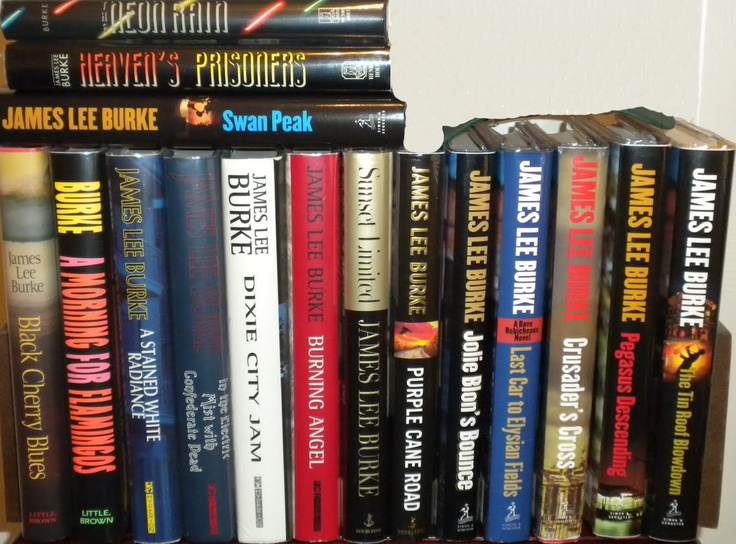Inspiring Older Readers
 posted on 07 Apr 2016
posted on 07 Apr 2016
James Lee Burke’s Robicheaux novels
I’m not someone who finds reading sequences or series of books very enticing. I couldn’t imagine settling down to read The Forsyte Saga or Harry Potter and the…. from beginning to end. When I was younger I managed the Lord of the Rings trilogy and even The Alexandra Quartet but it was a hell of a struggle. Now it would be pretty much impossible – my mind’s butterfly tendency has become its dominant trait – and I simply don’t have the patience to follow through without going off on another tangent.
There is one exception that proves this rule – the Robicheaux novels of James Lee Burke. There are now twenty in this continuing sequence and I rush to read each new one as it appears. Burke appears at first sight to be another detective genre novelist with the obligatory ‘damaged’ central hero who has a series of more or less catastrophic personal relationships, an adopted daughter (Alafair) and an irresponsible but irrepressible side-kick and best friend (Clete Purcell) whose sole function in the world seems to be to create chaos. However, this seems to seriously trivialise what is, I think, a major and important body of work that should be judged more as great novel writing rather than great detective fiction.
Burke’s reputation over the years the series has been written has fluctuated - he has also had a number of side projects that have allowed him to develop other characters that have also proved popular despite the fact that the Dave Robicheaux sequence is what has earned him the most accolades. For my money, Burke is one of the USA’s great contemporary writers and one who is interested in the darkest areas of the human soul. It is easy to see why his favourite writer, and one of his biggest influences, is William Faulkner but, perhaps more surprisingly, he also cites the impact of George Orwell as formative both of his style and his objectives as an author:
"he told the truth in a way that couldn't have been personally comfortable"
The character of Robicheaux is complex to say the least – something which I think is a direct reflection of Burke’s own identity. He is deeply respectful towards, and steeped in the traditions of, Louisiana and the Deep South, agonisingly ethical, committed to his family, respectful of religion without being religious, conservative and progressive at the same time and utterly committed to the view that humanity, if allowed, knows no depth it will not plumb. On top of which he is a weak man whose strength comes from the recognition of his weakness – an alcoholic always waiting to fall off the wagon but always determined to climb right back on it.
In a world of depravity Robicheaux is as close as it comes to a moral centre and he is prepared to risk himself in his determination to bring evil to light and ultimately to book. Decency and social justice are his indivisible guiding stars and if pursuing those ideals means bending rules he will do it but always in the knowledge of the potential contradictions.
I came to this sequence in entirely the wrong order because of a recommendation from a friend and I have subsequently had to backfill – starting from the first outing ‘Neon Rain’ and bringing me up to date with the last instalment ‘Light of the World’ and Burke has aged his characters alongside himself and his readers – so how much mileage Robicheaux has left in the tank must be open to speculation. I think Burke’s world view has become darker and gloomier as the years have gone by and the evil he finds in men now seems of a different density – more damaging and more threatening than it ever has been. For me, this change in tone really started with the twelfth novel – Jolie Blon’s Bounce – and the evil men do in his books now seems to have reached an almost unbearable intensity. Burke himself seems to acknowledge this dip into the Stygian gloom:
"Read Faulkner. It's all in there. The Sound and the Fury is like a textbook in writing that I think is technically better than Ulysses and in it Faulkner puts his hand deep into the fury and mire of human beings. The central theme that runs throughout all western literature is the search for redemption. The greatest story is Arthur's search for the holy grail which goes back to pre-Christian times. We put it in different terms today, but that search for the grail is always there. Faulkner said he'd never be able to exhaust that tiny postage stamp of Mississippi where he was from. I've got a slightly larger postage stamp, but so far as I can tell, everything I need seems to be within it." (quoted by Nicholas Wroe in 2007)
Burke is in danger of becoming a bit of an American national treasure and I really hope that this doesn’t happen. He has struggled against this – his dislike of the Bush administration is well known but he has also been critical of the liberal left and its failure to craft a programme that would offer a viable alternative to the neo-conservative narrative. I haven’t been able to find anything in print which gives me an indication of what the prospect of a Donald Trump presidency might be but if I had to choose anyone to give me an overview of what is happening to American politics at the moment it would be the 80 year old James Lee Burke.
Terry Potter
April 2016
(image: https://www.pinterest.com/pin/153474299772301929/)